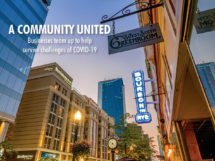The Lane Report‘s web series on how Kentucky’s business leaders are responding to the challenges of COVID-19.
Personal protective equipment manufacturer Bullard has ramped up production in the past two months to meet the sharp surge in demand for respiratory and faceshield products – including air-purifying respirators and hoods – to help protect those on the front lines of the fight against COVID-19.
As closures expanded, Tri-ED’s focus evolved to a theme of listen, connect and share – all tied to serving companies, communities and their elected leaders, and people.
Financial advising and insurance benefits firm HORAN took early action to help keep its employees safe from the spread of COVID-19 and provide education and encouragement to its clients.
Part 13: Camco amps up its role in the cleaning products supply chain during global pandemic
A Northern Ky. chemical manufacturer is operating 16 hours a day to refill supply chains.
Online grocery ordering, curbside pickup and delivery of goods from online retailers have become a mainstay of our socially distant lives. For online retail giant Amazon it brought a significant increase in demand for goods, especially critical supplies and items people purchase locally during normal times.
Part 11: Fabulous Furs pivots to sewing masks for medical workers
One of the largest faux fur manufacturers in the United States has pivoted its production to reusable surgical masks for frontline medical professionals combatting coronavirus in Northern Kentucky.
Kentucky-based insurance provider Humana responded early to COVID-19, quickly taking steps to improve coverage for its nearly 17 million members and ensure the safety of its more than 41,000 employees, of which 12,000 are in Kentucky.
While its mission of supporting Lexington businesses has not changed, Commerce Lexington Inc. has focused its attention to helping its 1,900-plus members get through the rough economic waters of COVID-19.
Part 8: Slowdown in sight, but March 2020 home sales up over 2019, and interest rates are low
In January and February, closings on Kentucky residential real estate were up about 9%, according to Kentucky Realtors, the state’s real estate association. Rising median prices meant larger transactions, though, and overall sales volume had an even more notable rise. Sales volume in February reached $667.5 million, besting last year’s figure by over 15%, the association said. Nationwide, more than 5 million homes were sold in February.

Part 7: Already adept at remote work, MCM assists others as they navigate COVID-19 obstacles
MCM, the largest CPA firm in Kentucky, has been “extremely busy” helping clients remain efficient during sudden disorienting change, said CPA Henry Hawkins, who leads MCM’s new COVID-19 Solutions Group.
The challenges presented by COVID-19 required quick action, but also thoughtful planning for the future. For Greater Louisville Inc., the metro area’s chamber of commerce, that meant finding new ways to help its members through the crisis while preserving its overarching mission: growing the regional economy.
Part 5: Verst Logistics reacts to ever-evolving COVID-19 impact
Paul Verst has been working 16-hour days the past several weeks, dealing with a range of COVID-19 effects on his family-owned logistics and warehousing company, Verst Logistics, headquartered in Northern Kentucky. Verst is chairman and CEO of the company, which has 1,900 employees in five states.
Don and Ruth Willoughby’s Lexington company Local Trivia Action has hosted live trivia games in numerous establishments across the state for 20 years, including more than 55 live games seven nights a week in Lexington, Georgetown, Northern Kentucky and Louisville. The Willoughbys were concerned not only about their business but the bar and restaurant community to which they are connected.
Part 3: Organizations of all sizes quickly adapt to remote work, changes in business
For Fayette Alliance, a small nonprofit dedicated to promoting sustainable economic growth, social distancing means a fundamental change to one of the main ways it conducts business. Fayette Alliance normally promotes its mission through face-to-face interactions and involvement in the community, said Brittany M. Roethemeier, executive director. Both of those activities are now on hold indefinitely.
Part 2: Continuity is the name of the game for Kentucky banks
Banks are a vital component of our infrastructure. To remain open and keep their employees safe, however, banks have had to alter the ways they interact with customers. Lobbies are closed, but drive-through lanes at Kentucky banks are open and customers have access to automatic and interactive teller machines, mobile apps and 24-hour online banking. Bank employees are still processing loans and financial transactions as quickly and smoothly as possible.
Part 1: KEMI was an early adopter of remote work during COVID-19 crisis
When Kentucky first began using social distancing measures to help slow the spread of COVID-19, businesses faced a challenge unlike any they had ever seen: Convert to a remote workforce, continue to serve their clients and customers, and weather a pandemic that is straining health care systems and weakening the economy.





















Add Comment